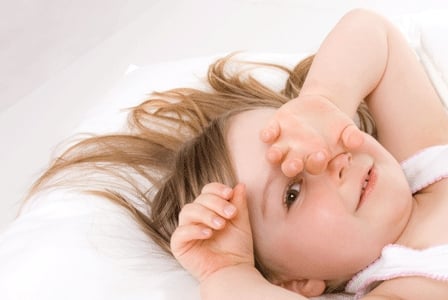
We don\’t automatically associate sleep disorders with children. Just how much sleep do children really need, and how can we help them get it?
Every night Jackie McDonald faces a battle. The Calgary mother finds herself in a clash of wills over bedtime with her 12-year-old daughter. Getting her to sleep has always been a source of conflict in the family home.
“This has been an issue since she was an infant,” McDonald tells alive. “It’s her personality. She’s very stubborn. She wants to stay up and be with us. She doesn’t want to miss anything.”
Getting enough
Despite her initial resistance, McDonald’s child still manages to get about nine hours of sleep a night. That amount isn’t bad, but it’s still shy of the recommended amount that kids her age need.
And if school-aged children don’t get adequate shut-eye, the consequences can be far more dire than the mere annoyance of their frustrated parents. Too little sleep can negatively affect learning, memory, concentration, attention, emotions, behaviour, socialization, and
physical health.
“When children are tired, it’s harder to function—just like adults,” says Reut Gruber, director of the Douglas Mental Health University Institute’s Attention, Behaviour and Sleep Lab, based out of Montreal’s McGill University.
What’s especially striking, she says, is that missing even small amounts of sleep—up to an hour a day, resulting in mild but chronic sleep deprivation—can have an enormous impact on child development.
“Any aspect of executive function, emotional regulation, mood, and the way they interact with other people can all be affected by sleep deprivation,” Gruber explains. “What we do during the day is manifested by everything that happens during the night. The association between sleep and behaviour exists in well-developed, well-adjusted children, not necessarily somebody with a sleep disorder.”
Trying to do it all
With modern society’s relentless pace and the perception that kids in elementary school need to start building college-ready resum? it’s no wonder sleep isn’t on anyone’s priority list. Between music lessons, sports practices, and tutoring sessions, kids today are generally overscheduled, which can lead to stress and anxiety, which in turn may cause trouble sleeping.
Then there’s parental guilt: working parents who stay late at the office may want to make up the time they’ve missed during the day with their children at night.
But a jam-packed schedule and lax bedtimes have a price, and it’s school-aged kids who are paying it.
“Everyone gets really excited about sleep training for babies, but that seems to fall off by the time kids are in school,” says Toronto parenting expert Alyson Sch?r. “In reality, we’re a nation of sleep-deprived people. There’s an attitude that you should just suck it up, that you’re a wuss if you need sleep.”
Hardly. Research into the effects of sleep—or lack of it—on young people points to some sobering facts.
How much sleep do kids need each night?
|
Eye-opening effects
The less sleep kids get, the worse their grades. Researchers at the University of Minnesota found that teens who got As averaged about 15 more minutes sleep than the B students, who averaged 11 more minutes than the C students. The Cs had 10 minutes more sleep than the Ds.
Other researchers have used MRI scans to show that sleep loss impairs memory and learning (Neuroscience, 2005). During sleep the brain shifts what it learned during the day to more efficient storage regions in the brain. The more you learn during the day, the more sleep you need at night to reinforce memory and facilitate learning.
Further research found that adolescents who got six hours of sleep or less a night scored higher on measures of depression, anxiety, trouble getting along with others, and delinquency than those who got nine hours or more.
Some studies point to a possible link between specific sleep disorders and attention deficit hyperactivity disorder (ADHD). Researchers have found that interrupted sleep impacts learning and results in ADHD-like symptoms. Ongoing studies are investigating the impact of sleep deprivation on the neurological functioning of children with ADHD.
There appears to be a link between sleep deprivation and obesity too. According to researchers at the University of Chicago, sleep loss boosts the hormone ghrelin, which signals hunger, and decreases its metabolic opposite, leptin, which suppresses appetite. On average, kids who sleep less tend to be heavier than children who sleep more.
Recognizing sleep deprivation
Sleep-deprived kids won’t necessarily look tired. Rather, they may be aggressive, irritable, and have short attention spans. They might be hard to wake in the morning, and it might take them a long time to become alert.
“Establishing a regular bedtime is so important,” Gruber says. “Kids need a consistent routine. Once you have a consistent routine, everything else falls into place. Nutrition and healthy eating have been made a priority, so why not proper sleep?”
Schafer agrees. “If we really want to do our kids a favour, we need to let them sleep,” she says. “We need to take this far more seriously. We wouldn’t malnourish our kids. Sleep is food for the brain.”
Tips to help your kids get enough sleep
- Set a regular time to wake up and go to bed; don’t vary these times by more than half an hour—even on weekends.
- Remove electronic distractions; don’t put a TV or computer in children’s bedrooms.
- Schedule exercise and sports activities earlier in the evening whenever possible to allow the body proper cool-down time to facilitate sleep.
- Avoid giving kids caffeine-containing foods and beverages before bedtime, for example, iced tea, cocoa, and chocolate.
- Establish a consistent bedtime routine.
What’s keeping kids up at night?
- computers: surfing the Internet, visiting chat rooms and social networking sites, emailing friends
- cell phones: chatting or texting pals
- television
- video games
- books (although reading is a positive activity, parents still need to establish a regular lights-out time)



























